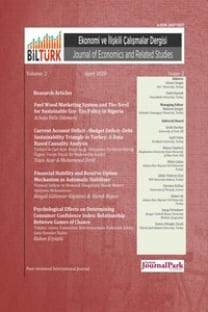Factor Affecting Muslim Students Repurchase Intention of Halal Food in Yogyakarta, Indonesia
Perceived halal label, brand image, perceived product quality, repurchase intention
Factors Affecting Muslim Students Repurchase Intention of Halal Food in Yogyakarta, Indonesia
___
- Aaker, D. A. (1991). Managing Brand Equity. The Free Press.
- Ahadi, N., Taghipour, A., Deebhijarn, S., & Sornsaruht, P. (2017). Effects of Thai Muslim Purchasing Behavior Towards Foreign Brands Usage of the Halal Sign of Imported Goods in Thailand. PEOPLE: International Journal of Social Sciences, 1(2), 54–65. https://doi.org/10.20319/pijss.2015.12.5465
- Alam, S. S., & Sayuti, N. M. (2011). Applying the Theory of Planned Behavior (TPB) in halal food purchasing. International Journal of Commerce and Management, 21(1), 8–20. https://doi.org/10.1108/10569211111111676
- Ali, A., Ali, A., Xiaoling, G., Sherwani, M., & Hussain, S. (2018). Expanding the theory of planned behaviour to predict Chinese Muslims halal meat purchase intention. British Food Journal, 120(1), 2–17. https://doi.org/10.1108/BFJ-05-2017-0278
- Anggraeni, M., Farida, N., & Listyorini, S. (2016). Pengaruh Perceived Value dan Brand Image Terhadap Repurchase Intention Melalui Word Of Mouth Sebagai Variabel Intervening Smartphone Samsung Galaxy Series. Diponegoro Journal of Social and Political of Science.
- Ariffin, S., Yusof, J. M., Putit, L., & Shah, M. I. A. (2016). Factors Influencing Perceived Quality and Repurchase Intention Towards Green Products. Procedia Economics and Finance. https://doi.org/10.1016/s2212-5671(16)30142-3
- Awan, H. M., Siddiquei, A. N., & Haider, Z. (2015). Factors affecting Halal purchase intention – evidence from Pakistan’s Halal food sector. Management Research Review, 38(6), 640–660. https://doi.org/10.1108/MRR-01-2014-0022
- Cooper, D. R., & Schindler, P. S. (2014). Business Research Methods (12th ed.). McGraw-Hill.
- Hair, J. F., Black, W. C., Babin, B. J., & Anderson, R. E. (2009). Multivariate Data Analysis (7th ed.). Prentice Hall.
- Ishak, S., Awang, A. H., Hussain, M. Y., Ramli, Z., Md Sum, S., Saad, S., & Abd Manaf, A. (2016). A study on the mediating role of halal perception: determinants and consequence reflections. Journal of Islamic Marketing, 7(3), 288–302. https://doi.org/10.1108/JIMA-02-2015-0010
- Jeddi, N., & Zaiem, I. (2010). The impact of label perception on the consumer’s purchase intention: An application on food products. IBIMA Business Review.
- Keller, K. L. (1993). Conceptualizing, Measuring, and Managing Customer-Based Brand Equity. Journal of Marketing. https://doi.org/10.2307/1252054
- Mukhtar, A., & Mohsin Butt, M. (2012). Intention to choose Halal products: the role of religiosity. Journal of Islamic Marketing, 3(2), 108–120. https://doi.org/10.1108/17590831211232519
- Na’im, A., & Syaputra, H. (2011). Kewarganegaraan, Suku Bangsa, Agama, dan Bahasa Sehari-hari Penduduk Indonesia. Badan Pusat Statistik. https://www.bps.go.id/publication/2012/05/23/55eca38b7fe0830834605b35/kewarganegaraan-suku-bangsa-agama-dan-bahasa-sehari-hari-penduduk-indonesia.htm
- Neuman, W. L. (2014). Social research methods: qualitative and quantitative approaches (Seventh ed). Pearson Education Limited.
- Parasuraman, A., Zeithaml, V. A., & Berry, L. L. (1988). Servqual: A Multiple-Item Scale For Measuring Consumer Perc. Journal of Retailing, 64(1), 12. https://doi.org/10.1108/02640470210447801
- Riki Wijayajaya, H., & Tri Astuti, S. R. (2018). The Effect of Trust and Brand Image to Repurchase Intention in Online Shopping. KnE Social Sciences, 3(10), 915. https://doi.org/10.18502/kss.v3i10.3182
- Schiffman, L. G., & Wisenblit, J. (2015). Consumer Behavior (11th ed.). Pearson Education.
- Schiffman, L., & Kanuk, L. L. (2007). Consumer Behavior (7th ed.). Pearson Education.
- Sekaran, U., & Bougie, R. (2016). Research methods for business : a skill-building approach (Seventh Ed). John Wiley & Sons.
- Sidi Izzudin, M., & Novandari, W. (2018). The Effect Of Perceived Quality, Brand Image On Customer Satisfaction And Brand Awareness Toward Repurchase Intention. Journal of Research in Management, 1(3), 32–43. https://doi.org/10.32424/jorim.v1i3.44
- Soleha, I., Arifin, R., & Rachmat, A. S. (2017). Pengaruh Citra Merek Dan Persepsi Label Halal Terhadap Minat Pembelian Ulang Produk Kosmetik Zoya Malang [The Influence of Brand Image and Perceived Halal Label on Repurchase Intention of Zoya Cosmetics Product in Malang]. Jurnal Ilmiah Riset Manajemen, 06(2), 166–176. http://riset.unisma.ac.id/index.php/jrm/article/view/443/478
- Team of Writers of P3EI. (2013). Ekonomi Islam. [Islamic Economics]. Rajawali Pers.
- Tsiotsou, R. (2006). The role of perceived product quality and overall satisfaction on purchase intentions. International Journal of Consumer Studies. https://doi.org/10.1111/j.1470-6431.2005.00477.x
- Yasid, Farhan, F., & Andriansyah, Y. . (2016). Factors affecting Muslim students awareness of halal products in Yogyakarta, Indonesia. International Review of Management and Marketing, 6(4), 27–31. https://www.scopus.com/inward/record.uri?eid=2-s2.0-84970023704&partnerID=40&md5=7d3b6f69888fb66cf45a38a7693df407
- Yoga, I. (2019). Halal Emotional Attachment on Repurchase Intention. Shirkah: Journal of Economics and Business. https://doi.org/10.22515/shirkah.v3i1.206
- Yun, Z.-S., Verma, S., Pysarchik, D. T., Yu, J.-P., & Chowdhury, S. (2008). Cultural influences on new product adoption of affluent consumers in India. The International Review of Retail, Distribution and Consumer Research, 18(2), 203–220. https://doi.org/10.1080/09593960701868464
- Zhang, Y., Fang, Y., Wei, K. K., Ramsey, E., McCole, P., & Chen, H. (2011). Repurchase intention in B2C e-commerce - A relationship quality perspective. Information and Management. https://doi.org/10.1016/j.im.2011.05.003
- Yayın Aralığı: Yılda 4 Sayı
- Başlangıç: 2019
- Yayıncı: Fatih DEYNELİ
The Effect of Biodiesel Market on Economic Growth: Policies in the European Union & Turkey
Fatih ÇEMREK, Hüseyin Naci BAYRAÇ
Factor Affecting Muslim Students Repurchase Intention of Halal Food in Yogyakarta, Indonesia
The Effect of Biodiesel Market on Economic Growth: Policies in the European Union & Turkey
Fatih ÇEMREK, Hüseyin Naci BAYRAÇ
